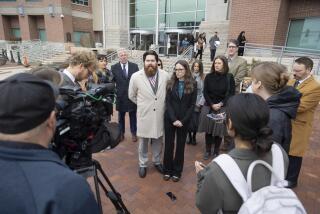Focus of Malpractice Case Is Restricted to Negligence Issue : Court: Judge’s ruling is a setback for lawyers contesting Simi woman’s death in trial touted as a test of HMO system.
- Share via
Attorneys contesting a Simi Valley woman’s death in a medical malpractice trial, heralded as a landmark test of the managed health-care system, suffered a major setback this week when a judge restricted the key issue to a question of simple negligence, a court official disclosed Thursday.
The disclosure came after a day of closing arguments and only after reporters began asking questions late in the afternoon when it became apparent that attorneys would not be arguing the issue, which had been debated--vehemently at times--throughout the four-week trial.
Ventura County Superior Court Judge Ken Riley had issued a gag order during the trial and attorneys on both sides were forbidden to discuss the latest development. Riley gave no reason for the gag order.
The ruling was made public by Riley’s clerk, who refused to discuss the matter further.
The ruling was made public hours before the case was scheduled to go to the jury for deliberations. Riley ruled that attorney Mark Hiepler failed to prove that two Simi Valley doctors refused to send an ailing patient to a specialist because they feared it would cut into profits.
Hiepler is suing Simi Valley doctors Elvin Gaines and Dan Engeberg for medical malpractice on behalf of Dave Ching and his 5-year-old son, Justin. Ching contends that the doctors negligently failed to diagnose his wife’s cancer in time to save her life. Joyce Ching, 35, died of colon cancer last year.
Hiepler had promised to put the health maintenance organization system of capitation on trial along with the two doctors, who he said were motivated by greed in withholding specialized treatment from Ching. Capitation pays physicians a set monthly amount for each HMO patient covered and offers financial incentives to doctors who hold down expenses and cut back on the number of patients they refer to expensive specialists. Riley had broken legal ground when he allowed the capitation argument to be introduced during the trial.
*
But on Wednesday he sided with defense attorneys when he ruled that the case was nothing more than a medical malpractice suit. But the judge declined to tell the jury of his decision. The jury is scheduled to begin deliberations Monday.
Hiepler did make one allusion to capitation when he told the jury that the “loud clamor of the defendants’ assembly line practice of medicine blocked out the signals,” of Joyce Ching’s cancer and led to a deadly delay in a proper diagnosis.
Defense attorney Michael Gonzalez objected to that line of argument and Hiepler never broached the subject again.
The trial itself was marked by countless defense objections and long delays as Riley consented to numerous private meetings with attorneys in his chambers whenever testimony strayed near the allegation of HMO complicity.
*
“This is first, last and only a medical malpractice case,” Gonzalez told the jury Thursday. That statement was his mantra throughout the trial and, apparently, Riley finally agreed in his ruling.
Experts in the health, insurance and legal professions had been watching the Ching case closely and many of them showed up Thursday. In fact, court was delayed for more than an hour in the morning as officials were overwhelmed by the number of people wanting to view the final day of trial.
Dozens of spectators--including reporters--were turned away as every seat in the courtroom was taken in anticipation of Hiepler’s condemnation of the managed health-care system.
Instead, Hiepler argued that the two doctors were simply negligent in diagnosing Joyce Ching’s cancer.
Hiepler told the jury that her death could probably have been avoided if the two doctors had referred her to a stomach specialist earlier than they did. For three months in 1992, the two primary care physicians treated Ching for stomach discomfort and missed diagnosing a large tumor in her colon while declining to send her to a specialist.
Hiepler had initially alleged that the two doctors purposely withheld the referral because of their compensation agreement with insurance giant Metropolitan Health’s HMO. The company, which was not named in this lawsuit, paid the doctors more if they cut back on referring patients to expensive specialists.
On the stand, Gaines conceded that his practice lost more than $1,000 when he ordered expensive tests and ultimately referred Ching to a specialist, who quickly detected the stomach tumor. But Gaines testified that he never discussed with his partners the financial impact of seeing Ching or of referring her to a specialist.
More to Read
Sign up for Essential California
The most important California stories and recommendations in your inbox every morning.
You may occasionally receive promotional content from the Los Angeles Times.













